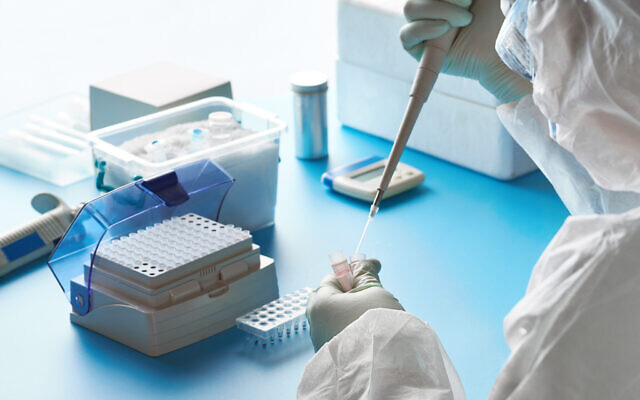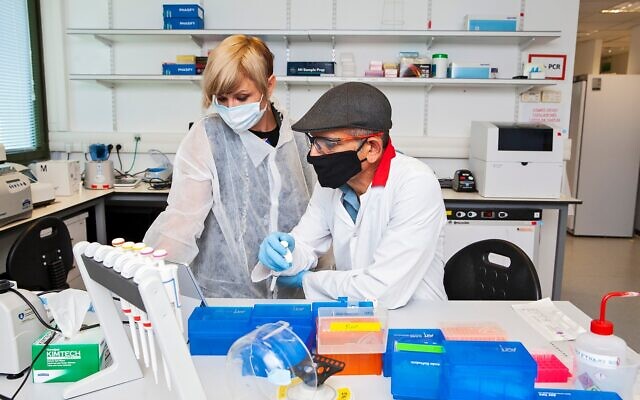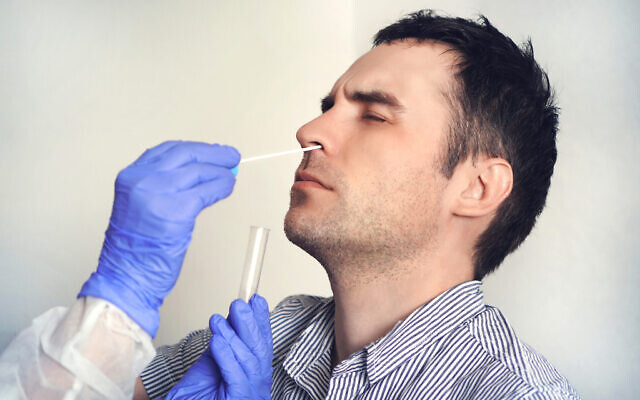AID Genomics says its tech will make on-the-spot testing a reality, getting regular life up and running; chief scientist says it can check planeload of passengers in an hour
By Nathan Jeffay, 08 July 2020
An Israeli company says it has developed a half-hour coronavirus test kit, and hopes it will become one of the screening solutions offered globally by China’s state-owned genomics group.
Izhak Haviv, chief scientist of AID Genomics, said his company has changed the enzymes and other components normally used in test kits in order to enable small batches of “VIP” tests to be processed in 30 minutes, and bigger batches in around double the time.
“To process a planeload of passengers would take me 75 minutes, and I can push it down to an hour,” he said, adding that he expects the kits to be manufactured and used internationally, and have similar levels of accuracy and false positives as existing kits.
AID partners with the Chinese-owned BGI Group, a major global player in testing, on several coronavirus-related projects, and believes this relationship could quickly give its new kit worldwide prominence.
One of the AID-BGI collaborations has been to set up the analysis centers and provide the kits, materials and technical support behind 70 percent of Israel’s coronavirus testing, Haviv said.
As well as heading AID’s labs, Haviv is a team leader with BGI, and said that he helped develop its machines and equipment — including the tests used to diagnose the first coronavirus cases in Wuhan.  An epidemiologist deals with a sample form a swab (iStock)
An epidemiologist deals with a sample form a swab (iStock)
He said that his new test kit has been designed to be compatible with BGI machines, and hopes that the Chinese company will decide to sell it as one of the standard kits intended for use with its machines.
There are various attempts around the world to reduce times for processing tests, and the current low is believed to be 90 minutes. Such tests, however, are generally seen as a premium product, mostly reserved for hospitals given their high cost. Haviv said his testing will be significantly cheaper than existing express services.
The new kit has been sent for approval to regulators, including the US Food and Drug Administration, said Haviv.
“They are taking samples and subjecting them to my kit, and they should be done in two to six weeks,” he said.
Bringing world back to its routine
He hopes that his innovation will help the world return to routine, by enabling concert venues, sports stadiums, and other places that draw crowds to carry out screening upon arrival.
“I hope as a result of this technology, activities involving many participants will be open and not need to close, and right now this is unrealistic,” he told The Times of Israel.
He said that with easy access to expedited screening, some industries will be able to use daily tests to get back on their feet, and commented: “Movie sets, for example, aren’t filming, but if everyone can get tested in the morning, they can know within half an hour if everyone is clean, and start filming.” Izhak Haviv, chief scientist of AID Genomics, with a colleague (courtesy of AID Genomics)
Izhak Haviv, chief scientist of AID Genomics, with a colleague (courtesy of AID Genomics)
The patient experience with AID’s kit will be similar to others — a swab inserted briefly in the nose. But Haviv said that every component of the kit related to analysis of the swab has been changed. One of the key changes is the use of different enzymes from those previously used for test kits. As the kit has been made more sensitive than others, the test samples need less processing and purification before results can be generated.
Swab testing relies on extracting ribonucleic acid (RNA) from swab samples, preparing it for analysis, and then analyzing it. A doctor in a protective suit taking a nasal swab from a person to test for possible coronavirus infection (iStock)
A doctor in a protective suit taking a nasal swab from a person to test for possible coronavirus infection (iStock)
Part of the process is to “amplify” the RNA from patients, which contains a limited, undetectable amount of virus, and increasing the quantity of RNA fragments identifiable as originating from SARS-CoV-2. Enzymes are used in this process.
Haviv said that his kit requires less RNA than others to reach a decision on whether a person has coronavirus. This means that the RNA needs to be subjected to a smaller amount of amplification than normal, and the amplification that is necessary takes place more quickly due to the newly chosen enzymes.
“We worked on this for three months,” he said. “Now we have an actual tool that is 50 times more sensitive than tests kits produced until now.”





